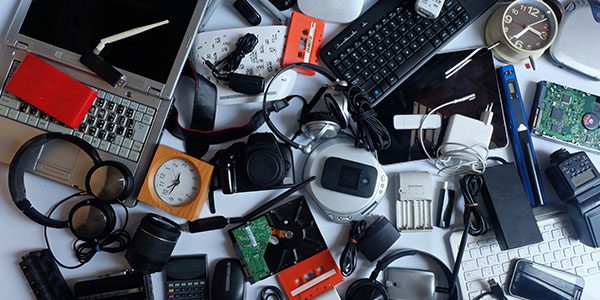R2 Certification Electronics Recycling: Your Assurance for Accountable Disposal
R2 Certification Electronics Recycling: Your Assurance for Accountable Disposal
Blog Article
Elevate Your E-Waste Administration With R2 Certification: an Extensive Summary
One secret approach to elevate e-waste administration techniques is by achieving R2 qualification. By exploring the advantages and procedures linked with R2 certification, a deeper understanding of just how it can transform e-waste administration approaches emerges, dropping light on a course towards sustainability and moral disposal methods.
Significance of E-Waste Monitoring

When e-waste is not handled appropriately, these hazardous substances can leak into the ecological community, triggering injury to wildlife and possibly entering the food cycle, posing threats to human health and wellness. The incorrect disposal of e-waste adds to air pollution and greenhouse gas emissions, aggravating climate modification and ecological degradation.

Benefits of R2 Certification

Firstly, R2 accreditation boosts integrity by showcasing an organization's commitment to lasting practices. It ensures customers, partners, and stakeholders that the firm adheres to rigid standards for e-waste administration - r2 certification. This reputation can result in boosted trust and enhanced partnerships with clients who prioritize ecological responsibility
Secondly, R2 accreditation aids mitigate dangers connected with inappropriate e-waste disposal. By following the stringent guidelines stated by the certification, organizations can lessen the chance of data breaches, environmental contamination, and legal effects. This aggressive approach safeguards the company's track record and decreases possible liabilities.
Lastly, R2 accreditation demonstrates a commitment to ecological stewardship - r2 certification. By sensibly handling digital waste with accredited procedures, companies add to the preservation of sources, decrease of contamination, and promo of a circular economy. This commitment not just profits the setting yet additionally straightens with progressing customer expectations for sustainable company practices
R2 Certification Process Overview
Having actually developed the advantages of R2 qualification in advertising integrity, threat reduction, and ecological stewardship, it is important to now describe the comprehensive process entailed in getting this accreditation. The R2 accreditation process starts with a detailed testimonial of the company's operational plans and treatments to guarantee compliance with the R2 criterion. This first analysis is vital in determining any visit homepage voids that require to be dealt with prior to continuing additionally.
Once the company's techniques line up with the R2 conventional requirements, an independent third-party auditor performs an on-site audit to examine the application and effectiveness of these techniques. This audit includes a comprehensive testimonial of paperwork, interviews with team, and physical assessments of facilities to verify conformity.
Complying with a successful audit, the company gets a certification choice based upon the auditor's searchings for. If authorized, the organization is provided R2 qualification, showing its commitment to liable e-waste administration. It is essential to keep in mind that keeping R2 certification needs continuous conformity with the standard's needs and regular audits to ensure continued adherence to finest methods in e-waste recycling and disposal.
Key Criteria for R2 Compliance
A vital aspect of attaining R2 conformity is making certain that all electronic waste (e-waste) processing centers meet rigid ecological and security requirements. To abide by R2 demands, organizations have to abide by essential standards that concentrate on responsible e-waste administration techniques. These criteria include carrying out a documented environmental, health, and safety Homepage and security monitoring system, ensuring the safe handling of data-containing gadgets, and carrying out detailed downstream due persistance to track the last location of e-waste products.
Moreover, R2 conformity necessitates the correct screening, refurbishment, and recycling of digital devices to extend its helpful life and minimize ecological impact. Facilities seeking R2 qualification need to likewise focus on worker health and wellness and safety by providing necessary training, personal protective equipment, and a safe workplace. In addition, keeping thorough documents of e-waste processing activities and routinely undergoing audits by accredited certifying bodies are crucial parts of demonstrating continuous compliance with R2 standards.
Impacts of Lasting E-Waste Practices
The implementation of lasting e-waste methods according to R2 conformity not only guarantees ecological and security criteria are met but also substantially influences the total lifecycle of digital items. By sticking to R2 standards, electronic waste administration processes come to be extra efficient, reducing the environmental impact of electronic items. Lasting e-waste techniques promote the proper disposal of digital components, ensuring that unsafe materials are handled properly and do not finish up contaminating the environment.
In addition, lasting e-waste practices can contribute to task development in the recycling and repair fields, cultivating financial development while advertising ecological duty. Overall, the adoption of sustainable e-waste practices under R2 certification serves as an essential step towards achieving a more ecologically sustainable electronics industry.
Verdict
In conclusion, implementing correct e-waste management techniques is critical for ecological sustainability and source conservation. R2 accreditation plays an essential role in ensuring responsible handling and disposal of digital waste. By sticking to the strict criteria stated by R2 criteria, companies can not only reduce their environmental influence however also contribute to an extra lasting future for generations to find.
One key approach to raise e-waste a fantastic read management practices is by acquiring R2 accreditation. By exploring the advantages and procedures connected with R2 accreditation, a deeper understanding of just how it can transform e-waste management techniques emerges, losing light on a path towards sustainability and moral disposal practices.
The R2 qualification process starts with a detailed testimonial of the organization's functional policies and procedures to make sure compliance with the R2 criterion. If approved, the company is given R2 qualification, demonstrating its dedication to responsible e-waste administration. Overall, the fostering of lasting e-waste methods under R2 qualification serves as a critical step in the direction of achieving a much more eco sustainable electronic devices sector.
Report this page